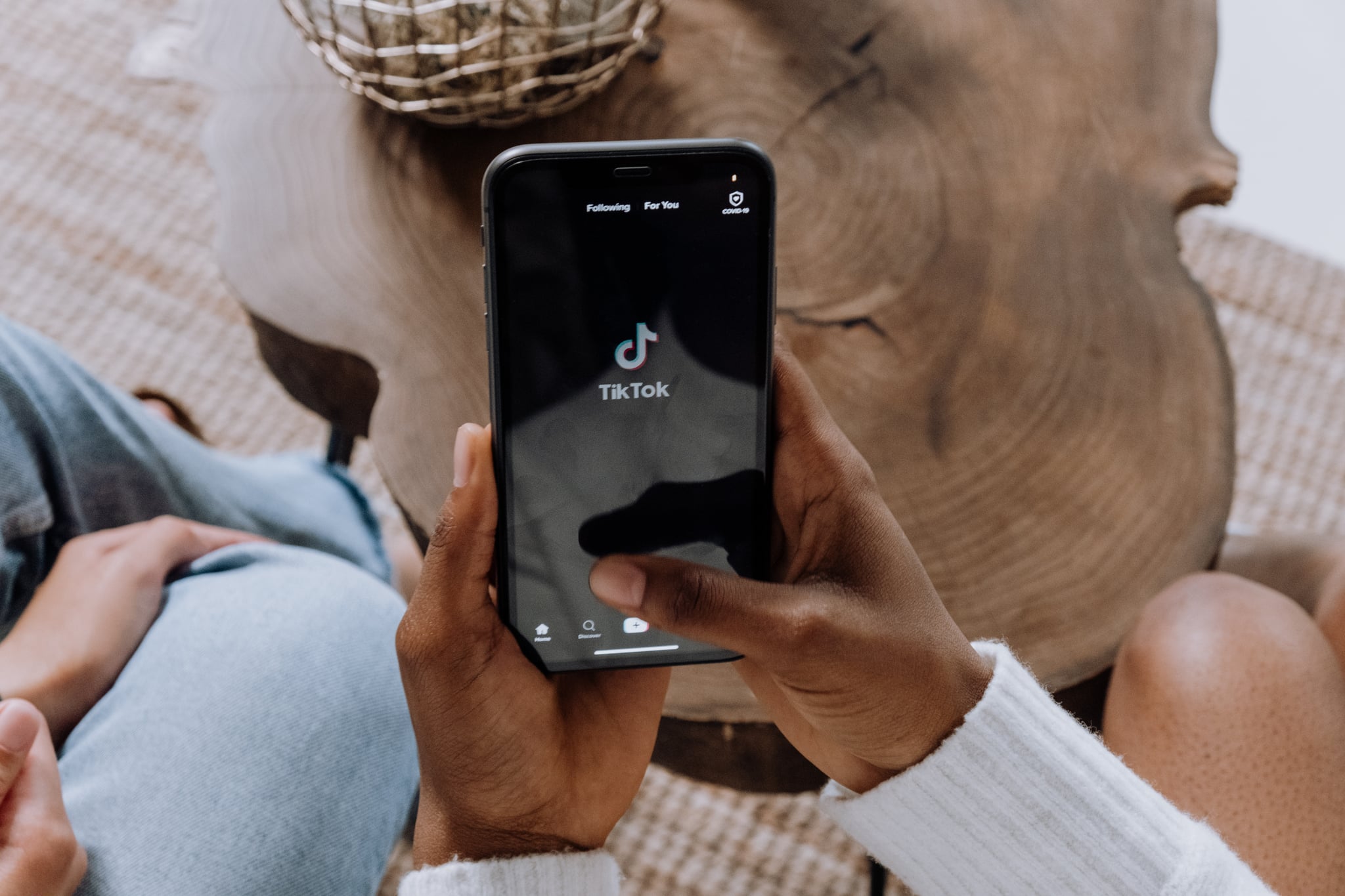TikTok's Impact on the Music Industry — Is It Good or Bad?
TikTok's Changing the Music Industry For Better or Worse, and Artists Are Caught in the Middle

Image Source: Pexels / Cottonbro
In the years since TikTok launched internationally in 2017, it has solidified itself as the biggest social media platform among Gen Z — a status that was no doubt expedited by months upon months of young people being cooped up in their houses with little to do other than scroll through the app amid the COVID-19 pandemic. The app has become beloved by Gen Z and millennial music fans for its unique ability to expose us to new artists and grow musician's platforms in a way that feels both authentic and trendy — or, at least, that's how it started.
As more artist's songs blow up on the app, some TikTok users have grown sceptical of "viral hits" and, more specifically, how the mainstream music industry may be influencing music's corner of TikTok. As an increasing number of artists repped by major labels flood onto the app, fans have sensed that so-called "viral hits" seem to be more calculated and inauthentic — the opposite of what TikTok users once loved about the app.
In July 2021, singer Gayle asked her followers for songwriting ideas, and an account named @Nancy_Berman requested a breakup song using the alphabet. The musician responded with an acoustic version of "abcdefu," the clip promptly went viral, and the song was officially released by Atlantic Records weeks later. Gayle's "abcdefu" would eventually rise to No. 1 on both the Billboard Global 200 and Billboard Global Excl. US charts, a shining beacon of just how powerful music TikTok had become. Fans would attribute its breakout success to the TikTok community and Gayle's on-the-fly writing skills, but the novelty surrounding the song and its origin story quickly faded.
@gaylecantspell Reply to @nancy_berman definitely not based off personal experience... #orginalsong #newmusic #plslikethisaccount #hastagsworkapparently #acoustic
♬ abcdefu - GAYLE
In January 2022, Daniel Wall claimed in a TikTok that fans had been "lied to" about the song and that the comment requesting the song was made by a marketing manager at Atlantic Records — not a fan. Gayle's following suddenly had to question the authenticity of "abcdefu"'s success. Was the song really written on the fly, inspired by a TikTok comment? Or did a brilliant marketing manager just set up an elaborate TikTok campaign around a song Gayle had already written and that her label had already chosen as her next single?
Atlantic Records says it wasn't a stunt, telling Newsweek that while the comment was left by Berman, "it was simply a playful comment, as both she and GAYLE knew the song was about to drop, with the track and the video already recorded." (However, they didn't make this explicitly clear to Gayle's followers in their TikTok interaction.) They also say the song didn't go viral because of Gayle's original acoustic TikTok, claiming to Newsweek it actually took off in November 2021, months after Gayle's initial TikTok, because of a viral video of the song being translated into American Sign Language. Fans had apparently made up their minds, however, with most of the top comments on Gayle's original TikTok calling it a "setup" and reluctantly acknowledging how brilliant her label's marketing strategy was. This is just one example of record labels seemingly utilising TikTok in a way users find insincere — but it does show how untrusting users have become of the music industry and its alleged "plants," particularly on an app they love because of its authentic-appearing content.
Many well-known musicians' approach to the app only adds fuel to the fire. On 22 May, Halsey posted a video claiming their record company wouldn't let them release their song "So Good" unless they faked a viral moment on TikTok, despite them having been in the industry for eight years and selling over 165 million records. "They are saying if they don't reach some imaginary goalpost of views or virality, then they won't give me a release date at all," they tweeted. Many followers questioned if this was yet another meta-marketing technique that pit Halsey against her label (especially considering the video — which ultimately went viral — actually featured the unreleased song Halsey said her label was holding back). Two of the top comments under the original video read, "I love her, but how do we know this isn't reverse psychology?" and, "This has to be my least favourite lie for marketing."
@halsey
I'm tired
Meanwhile, FKA Twigs posted a TikTok sharing that she got "told off" for not making enough effort on TikTok. Charli XCX made a reaction video when her label asked her to do her "8th TikTok of the week" (though she later admitted she was "lying for fun"). Florence Welch of Florence and The Machine also recently posted a TikTok claiming her label is "begging" her for lo-fi TikToks, adding, "pls send help." Macklemore added to the conversation on Instagram, sharing that, after so much change in the music industry, he and his team have "spent dinners talking about algorithms, how to make content, consistency, likes, views, and plays," and that, "spiritually, I felt the negative effects." He went on to share that fear is plaguing the music industry, and he sees his peers pressured by their labels — but that he believes there is "still an appetite for art."
And it's true there's an appetite for art. The benefits of TikTok for small artists looking for a big break are obvious. It has allowed musicians to grow their fan bases on their own, even if they don't have a major record label, making fame accessible quite literally from the musician's bedroom. TikTok user Jawsh 685's "Laxed-Siren Beat" went viral, prompting Jason Derulo and BTS to collab on a remix of the sound. Ultimately, the little-known producer gained over 250,000 followers on the app and ended up with a Billboard No. 1 single.
But even those who do find incredible success on the app understand its risks and drawbacks. Singer Gabi Sklar, who skyrocketed from 30,000 TikTok followers to 800,000+ over a three-month period in 2022, had many record companies reach out with nearly the same email requesting to set up a meeting with her — but only after she had grown a following from videos of her singing in her laundry room. She tells POPSUGAR, "We're living in a time where a 30-second video can reach over three million people in just 24 hours . . . it's amazing, it's life-changing, and it's terrifying." For Sklar, this means being able to grow a real audience, saying, "It's allowed independent artists to have their moment." But at the same time, she understands that the "major concern" is that "analytics are becoming the driving force, not the art." Now, Sklar is still in the process of negotiating a record deal that works for her while she continues to expand her online presence, acknowledging both the opportunities her TikTok has provided her and the flaws it comes with.
One of those flaws is that record labels appear to be using the platform not only to market their current artists but also to find new ones without having to do the same level of work as they once had to do. Using TikTok, they can easily find musicians who already have a massive social media following. The TikTok artist's established fan base mitigates the need to dole out big marketing budgets to get them on a large audience's radar because they're effectively doing it themselves. It's similar to the ongoing conversation around models being hired for their Instagram following. Such a large emphasis on "having a following" and "going viral" not only takes away from other artists, but it also feels too contrived for an app that's appeal is its "homemade" approach.
Seemingly depending on an algorithm, especially a notoriously unpredictable one, to find and market talent is a calculated process that lacks creativity. It sells already-successful artists short, pushing them to adhere to an algorithm they never needed the approval of before TikTok (and don't necessarily need to continue their success). Meanwhile, record labels are jumping on the bandwagon of one-off viral creators without taking into account whether the artist actually has a chance at longevity in the industry. It's a lazy, reactive approach that shows industry leaders signing who they see to be "the moment" instead of creating moments and pushing their already-successful artists to be "viral," whether or not they want to be (and whether it's even possible). As we're already seeing, it's likely pushing artists away from their labels.
Ultimately, relying so much on TikTok is a losing strategy for major labels, whose artists have been losing streamers to independent artists on Spotify since 2017. Additionally, all indications suggest TikTok may soon become a music label itself, with The Washington Post reporting TikTok launched a song distribution platform in March and has published job postings for "A&R Manager" positions. So, while isolating artists by making them beholden to a TikTok algorithm is harmful to major-label artists and the labels themselves, it's clearly good for TikTok as a music platform (and a competitor).
Perhaps once labels understand that they can't replicate what users love about TikTok, they'll slow down their viral-chasing approach and spend more time scouting and nurturing undiscovered talent. If they can't stop relying on TikTok, hopefully, at the very least, they can find more clever ways to hide their love of the algorithm from its intuitive users.






